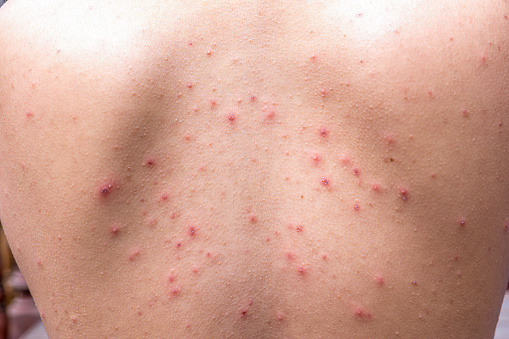Body Acne Solution - Bacne Solution for Mens and Womens
Body acne is a common skin condition characterized by the presence of pimples, blackheads, whiteheads, and other types of blemishes on the back, chest, shoulders, and other areas of the body. While it's most commonly associated with teenagers going through puberty, body acne can affect people of all ages and genders.
Body acne, also known as bacne, can be an embarrassing and uncomfortable condition that affects people of all ages and genders. It can be particularly frustrating because it often occurs in areas that are difficult to reach, making it challenging to treat and prevent.
Hormonal changes are a common cause of body acne, particularly during puberty when the body undergoes significant hormonal fluctuations. These hormonal changes can cause the skin to produce more oil, which can clog pores and lead to the formation of acne. Similarly, hormonal changes associated with menstrual cycles, pregnancy, or menopause can also cause acne to develop.
Genetics can also play a role in the development of body acne. If your parents or siblings have a history of acne, you may be more likely to develop it as well.
Sweat and friction are also contributing factors to body acne. Sweat can mix with oil and dirt on the skin's surface, clogging pores and causing acne to develop. Tight-fitting clothing or carrying a heavy backpack can cause friction and sweat buildup, particularly in hot and humid weather.
Certain medications can also cause acne as a side effect. These medications include steroids, lithium, and some anticonvulsants.
To reduce the appearance of body acne, it's essential to keep the skin clean by washing the affected areas with a mild soap or cleanser twice a day. Exfoliating once or twice a week with a gentle scrub can help remove dead skin cells that can contribute to clogged pores. Moisturizing with a non-comedogenic moisturizer can also help keep the skin hydrated and prevent dryness, which can trigger the overproduction of sebum.
Wearing loose-fitting clothing can help prevent friction and sweat buildup on the skin. Over-the-counter topical treatments that contain benzoyl peroxide, salicylic acid, or alpha-hydroxy acids can also be effective in reducing the appearance of body acne.
If your body acne is severe or doesn't respond to over-the-counter treatments, it's important to seek professional help from a dermatologist. A dermatologist can prescribe stronger medications or perform procedures such as laser therapy, chemical peels, or extractions to help clear up the skin. They can also provide guidance on how to prevent future breakouts and manage any underlying conditions that may be contributing to the acne.
Causes of Body Acne:
There are several factors that can contribute to the development of body acne, including:
Hormonal Changes: Hormonal changes during puberty, menstrual cycle, pregnancy, or menopause can trigger the overproduction of sebum, the natural oil that lubricates the skin, leading to clogged pores and the formation of acne.
Genetics: Family history can also play a role in the development of body acne. If your parents or siblings have a history of acne, you may be more likely to develop it as well.
Sweat and Friction: Sweat and friction can irritate the skin and lead to the development of acne. Wearing tight-fitting clothing or carrying a heavy backpack can cause friction and sweat buildup, especially in hot and humid weather.
Medications: Certain medications, such as steroids, lithium, and some anticonvulsants, can cause acne as a side effect.
Solutions for Body Acne:
There are several solutions that can help reduce the appearance of body acne:
Keep the Skin Clean: Wash the affected areas with a mild soap or cleanser twice a day to remove excess oil, dirt, and sweat that can clog the pores.
Exfoliate: Use a gentle exfoliating scrub once or twice a week to remove dead skin cells that can contribute to clogged pores.
Moisturize: Use a non-comedogenic moisturizer to keep the skin hydrated and prevent dryness, which can trigger the overproduction of sebum.
Wear Loose-Fitting Clothing: Avoid wearing tight-fitting clothing, especially in hot and humid weather, which can cause friction and sweat buildup on the skin.
Use Topical Treatments: Over-the-counter topical treatments that contain benzoyl peroxide, salicylic acid, or alpha-hydroxy acids can help reduce the appearance of body acne.
Seek Professional Help: If your body acne is severe or doesn't respond to over-the-counter treatments, see a dermatologist who can prescribe stronger medications or perform procedures such as laser therapy, chemical peels, or extractions to help clear up the skin.








0 Comments
Don't spam and spam links, please don't use abusing words
Emoji